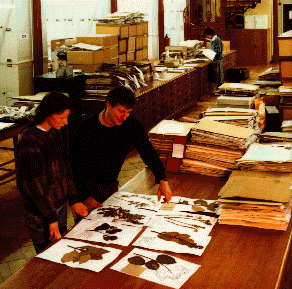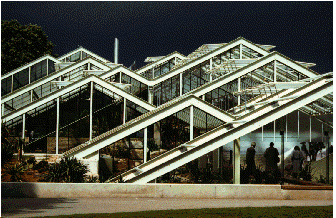Kew's Science Aim:
In this context, the Science Aim at RBG Kew is to continue to develop, enhance and maintain Kew's contribution to innovative basic and applied botanical research, conservation,, plant-based teaching, the maintenance of plant diversity, and to produce tangible and acknowledged results to improve environmental management.
Three scientific programmes derive from this aim:
Four other programmes that interact with these are Visitor Attraction, Education, Institutional Support and Income Generation. The Heritage Support programme is concerned with our historic buildings, landscape and garden artifacts.
The Herbarium, the Living Collections Department and the Jodrell Laboratory interact on the scientific programmes, which have two major corporate objectives:
 Kew Herbarium, Wing C
Kew Herbarium, Wing C
Projects focus mainly on the Institute's collections of plants, both living and preserved, and scientific literature. Full use is made of the extensive human knowledge base and expertise in taxonomy and horticulture in the Institute as a whole. Research sub-programmes, designed to improve the world's understanding of the plant kingdom include:
 The Princess of Wales Conservatory
The Princess of Wales Conservatory
Property Rights
Kew has a clearly stated position with regard to ownership rights related to profits that might result from its research leading to commercial development of products from plants from other parts of the world, and has a number of agreements and convenios with a number of countries where projects take place.